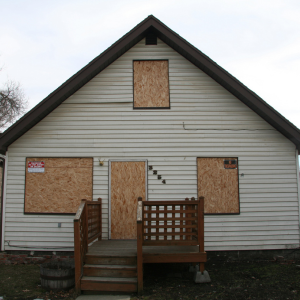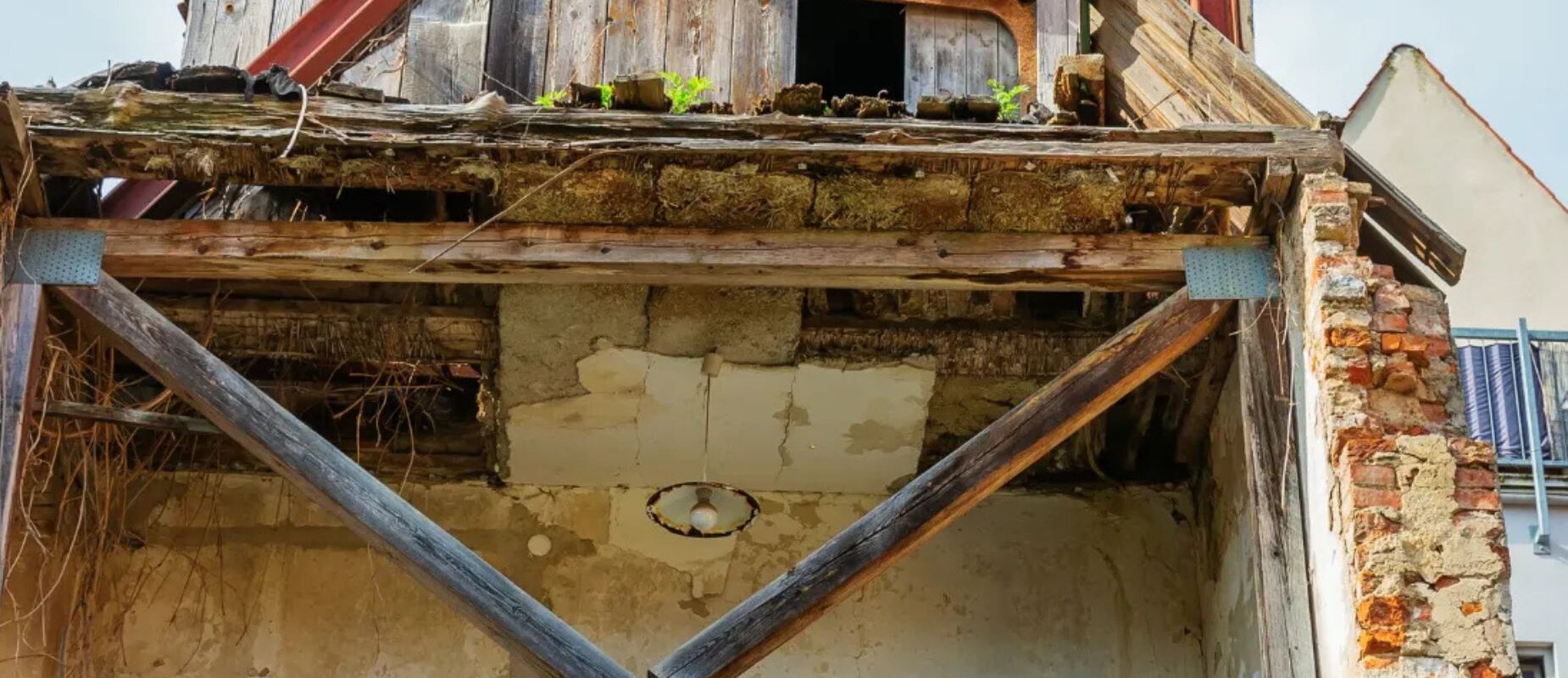
How To Sell A Condemned House In Plano, Texas
Owning a condemned house is serious business, whether due to years of neglect, continuous flooding, or simply inheriting one. Navigating the sale of a condemned house takes real estate expertise and government approval. The process is stricter and complex, as the decisions aren’t solely yours to make. For those prepared to take on a challenge or those seeking an easier path, we have the tips and tricks to guide you in successfully selling a condemned house.
What Does A Condemned House Mean?

A condemned house means that the property is no longer up to code and is violating health, safety, property, and zoning laws to the point that it is uninhabitable.
It requires multiple inspections and a significant risk to your safety for a property to be deemed uninhabitable and eventually condemned. A house doesn’t simply get condemned for small code violations, such as plumbing issues or a minor hoarding problem, as it would take severe health and safety risks for your local government to interfere with your property.
Reasons A House Gets Condemned
Even though you privately own your property, it must comply with health and safety laws. Remember, while owning a condemned house can be a hassle, these laws are in place for your good. Following them ensures not only your safety but also that of your neighbors.
Sometimes, the damage is so severe that the house’s facade becomes an eyesore, notifying and worrying your neighbors. Meanwhile, other issues are unsuspecting, such as little cracks in the wall hiding bigger problems. These examples fall under one umbrella: a code violation.
Common reasons a house is deemed unlivable and thus condemned are:
- Structural Damage. These damage the foundation and structure of the house, such as the flooring and load-bearing walls. Essentially, these are damages that could cause the house to crumble down. Common signs of structural damage are cracks on the walls or water leaking around the house.
- Health Hazards. These hazards could cause serious health issues to the tenants of the property. Examples include asbestos in older homes, pest infestations, or black mold growing on the house.
- Utility Problems. These refer to the home’s plumbing, electrical, heating/cooling systems, or HVAC, to name a few. Some major problems that could lead to a house being condemned are bursting pipes, damaged electrical wiring, or gas leaks.
- Illegal activities. In some cases, where your property has been abandoned or neglected, squatters could occupy it, and illegal activities ensue. These activities can damage the property and/or leave hazardous materials in the house, making it uninhabitable.
- Other Concerns. Other safety issues include fire hazards, abandonment, and extreme clutter due to hoarding. Additional code violations include housing issues due to a lack of permits or zoning violations.
These issues can be caused by natural disasters, neglect, or a poorly constructed house. Most condemned houses result from a combination of these factors, which are usually interconnected. For example, continuous flooding in your area could cause your home’s foundation to deteriorate, leading to moisture being trapped inside, creating a perfect breeding ground for pests and mold.
It’s always better to be proactive to prevent your home from disrepair. Have your house inspected and maintained annually to avoid future headaches.
What To Do If Your House Is Condemned
Finding out that your property has been condemned can be a shock, and you may be unsure of what to do next. Your initial steps are crucial to ensure your safety and assess your future house options.
After your house has been inspected by the government and is deemed a hazard, it may be condemned. Your local government will inform you of the reasons for the condemnation and provide a timeline for making these repairs; otherwise, penalties may be imposed.
Here are some tips to help you navigate this situation.
Look for Temporary Housing

Once your house has been condemned, a red tag will be placed on it, signaling it is officially condemned. A red tag indicates that your home is unsafe and that the local government is officially interfering with your property.
After this happens, you cannot continue living in the house. You must vacate the property and find temporary housing until you can make the necessary repairs to have the condemnation lifted.
Be warned that living in a condemned home is illegal, even if it’s your own, and there will be consequences.
This doesn’t mean you cannot enter the home; it simply means you can only enter to make the necessary repairs. Be sure to follow the proper process, such as obtaining the required permits, as the local government will closely monitor your property.
Seek Legal Counsel
It is important to consult an attorney because the government is involved in condemned house cases. This, in turn, means that there are several ways this situation could lead to court hearings, so having counsel would be beneficial.
For example, you would need an attorney if you believe the inspector made an error and your property should not have been condemned. While this is rare and unlikely to result in a favorable outcome, it’s still worth considering.
You would also need legal advice if the initial timeline to make the necessary repairs is insufficient. Take note that the burden of proof will be on you to show that more time is needed to complete the repairs.
You will especially need an attorney if your home is being condemned due to eminent domain, such as when the government offers to buy your property for less than its market value.
Decide Your Next Steps
If your house has been condemned, it’s best to take a step back and re-evaluate your goals for the property. Repairing a condemned home is costly due to the serious nature of its problems, so in some cases, repairing might not be the best choice.
You have two options: sell or repair the house, each with its own advantages and disadvantages. The ultimate decision depends on your financial capacity, patience, and future plan for the property.
You may also want to consult a real estate professional to help guide your decision. They can advise whether your property is worth the time and investment or if it’s time to let it go.
The Difference Between Eminent Domain and a Condemned House

Eminent domain is the power of the local government to take private property for public use. This happens when the local government needs the land for projects like creating highways, building parks, or other developments that serve the public good.
This differs from a house being condemned due to unsafe conditions or code violations, where if your house is condemned due to safety hazards, you may be able to fix those issues to regain control of your property. Essentially, the difference between a standard condemned home and one condemned under eminent domain is the reason for the condemnation.
However, if your house is condemned through eminent domain, you must enter into an agreement with the government concerning the forced purchase of your home. It’s not all bad, though, as the government is legally obligated to give you fair compensation, usually the market value of your property. If they lowball you, you can take the matter to court.
Can I Sell a Condemned House in Texas?
If you don’t want to deal with the repairs or you were set back in the selling process due to the condemnation, the good news is that you can still sell a condemned house.
It’s still your property, and you still have rights to it, including your right to sell.
Of course, you are legally required to disclose the issues that led to the property’s condemnation. Selling a condemned property would also be a hard sell, as buyers won’t be able to view the house safely before purchasing it and would have trouble securing financing. So, even if nothing stops you from selling a condemned property, it’s difficult if you’re going the traditional route.
Remember that you would need your local governing body to approve the sale, as selling a condemned house doesn’t eliminate the problem–it only transfers it to the new owners. Therefore, the buyers should have the means to make the necessary repairs, or the government could seize the home or put it up for auction.
If you want to proceed with the sale, your best bet would be to target cash buyers or real estate investors.
Options in Selling a Condemned House in Plano, TX
If you want to sell a condemned house, be prepared to invest time, money, and effort. Selling any home is already a big undertaking, but selling a condemned home adds a few more crucial steps. Then, add your local authoritative body to the mix, along with even more expenses, and it’s a lot to deal with. That’s not to say that selling a condemned home is a lost cause.
You still have two solid options: sell the traditional way (cause you still can) or sell to real estate investors.
Repair the Home, then Sell with a Real Estate Professional

If you decide to go this route, you will most likely need to lift the condemned status of your home before your real estate professional can sell it. This means addressing the necessary repairs.
If you don’t deal with the repairs, it wouldn’t be cost-effective to hire a real estate professional in the first place because a condemned home will sell for less than its market value. It may not sell at all since traditional buyers will be wary of purchasing a property with significant issues. Additionally, they would have trouble securing financing, as banks typically won’t approve loans for condemned houses.
Even though selling a repaired home should normally give the best price, you should consider all the initial investments you’ve made. These include repairs, hiring licensed professionals, and your real estate professional’s 6% commission fee.
Selling with a real estate professional would look like this:
Step 1. Address code violations.
Step 2. Obtain the necessary permits
Step 3. Hire licensed professionals to repair the house.
Step 4. Habitat was re-inspected to obtain the “Declaration of Occupancy” certification, confirming that the house is safe for habitation.
Step 5. Ready the home for Sale.
Your real estate professional will handle the next steps once the home is ready for occupancy. However, the necessary repairs must be completed before you can sell the property. Be prepared for a realistic timeline, as the repairs and the sale process could take months to finish.
Sell ‘As-Is’ to Real Estate Investors

Most homeowners don’t want to deal with the problems of a condemned home, which is why these properties are often sold to cash buyers for real estate investors.
With this option, you sell your property “as-is,” even with the floors coming apart or walls crumbling. It’s a package deal, one that a real estate investor won’t bat an eye at. What might be a homeowner’s worst nightmare, like a termite infestation or a missing roof, is just an average workday for them.
By purchasing the property, they will literally take the problem out of your hands and into theirs. Lifting the home’s condemned status becomes their responsibility, one which they will happily take on, as real estate investors are house flippers actively looking for fixer-uppers.
Selling your property to real estate investors would look like this:
Step 1. Go online and search for your local real estate investor.
Step 2. Give them the details of your home.
Step 3. Receive a cash offer for it.
It’s a quick and simple process that benefits both parties. You’ll have one less problem, and they’ll have a house to flip.
Both options are not mutually exclusive; you can look into both, and it’s best to do so. A real estate professional is a valuable asset, even if you don’t ultimately decide to sell your house through them. An initial consultation can help you determine which route to take and assess the severity of your home’s condition. On the other hand, contacting a real estate investor is free, and you can always reject their offer without any consequences.
Helpful Plano Blog Articles
- Plano, Texas Property Tax Rate
- Plano, TX Neighborhood Map
- Plano, Texas Property Managers
- Best Things To Do In Plano With Kids
- How To Sell A Condemned House In Plano
Final Thoughts: How To Sell A Condemned House In Plano, Texas?

Seeing the ‘Notice of Condemnation’ on your front door can feel like the rug being pulled underneath you. How do you fight it? How do you lift it? Where do you even begin? You don’t have to go at it alone. Let us help you!
We’re the Southern Hills Home Buyers, and we know firsthand the struggle of handling a condemned home. We specialize in purchasing property quickly, offering a fair price that leaves both of us satisfied with the outcome.
Simply fill out the form below for a free, no-obligation cash offer sent to your inbox.
With us, there are no out-of-pocket expenses, no hidden fees, plus the closing is on us!
If you’d like more information or have any questions, give us a call at (214) 225-3042.
Discover everything you need to know about selling a house in Texas. This guide provides insights applicable across the state, whether in Plano, Dallas, Houston, San Antonio, Austin, Fort Worth, or surrounding areas. We also buy houses, making the process quick and hassle-free for homeowners looking for a fast sale. For personalized assistance or to explore your options, We’re here to help every step of the way! Contact Us at (214) 225-3042.
Get Cash For Your Plano, Texas House Today
We buy houses in Plano, Texas without the hassle and red tape. Get your no-obligation cash offer for your home and just be done. Selling in as-is condition has never been easier.

Author: Brandon Beatty
Brandon Beatty’s passion is buying income producing properties and building businesses. He focuses on buying houses and small multi family buildings in Texas that have an opportunity to add value through proper management and renovations while helping property owners sell quickly and without the hassles of a traditional sale.
Brandon is the founder of Southern Hills Home Buyers and has been featured on real estate news sites, including Zillow, Redfin, Realtor.com, HomeLight, List With Clever, Offerpad, and OpenDoor.




